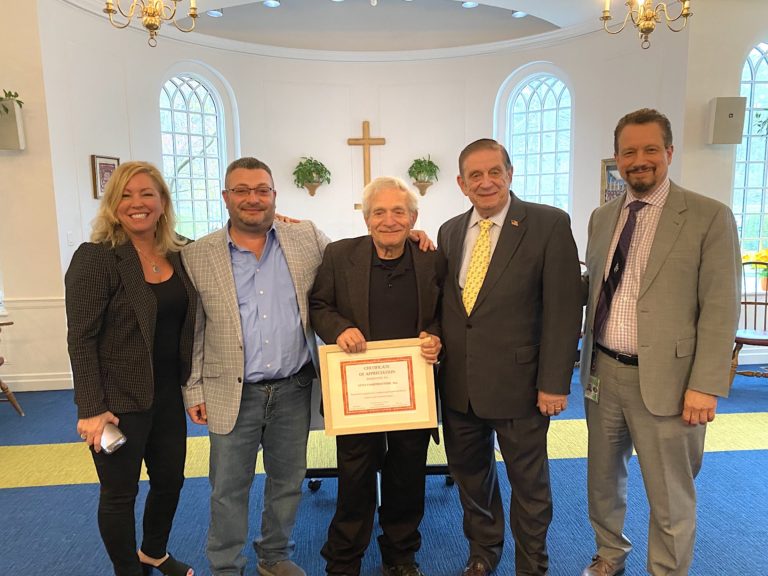By Anne W. Semmes
Greenwich has a unique connection to some big news—a successful new treatment for the most common cancer among young children. The FDA approved last week the first-ever gene breakthrough therapy for children and young adults suffering from acute lymphoblastic leukemia. “We’re entering a new frontier in medical innovation with the ability to reprogram a patient’s own cells to attack a deadly cancer,” is how FDA Commissioner Dr. Scott Gottlieb describes the new treatment.
“My hope is that this treatment method will address itself to lung cancer, breast cancer, pancreatic cancer, all kinds of cancer,” says Greenwich’s Barbara Netter, who can hardly contain her excitement over the FDA’s approval. Netter and her late husband, Edward, early on pioneered support of this gene therapy treatment through their Stamford-based foundation, the Alliance for Cancer Gene Therapy (ACGT), the only non-profit dedicated exclusively to cell and gene therapy treatment for all types of cancer.

“When other organizations, including the NIH, considered gene therapy too risky, ACGT believed in the science and funded us when no one else would. ACGT really kept us going and kept the research alive. Without them, we wouldn’t have had a clinical trial and I don’t think we’d be where we are today.” These are the words of Dr. Carl June, the immunologist at the University of Pennsylvania’s Perelman School of Medicine who is being heralded worldwide for his revolutionary research that has led to a treatment now keeping hundreds of cancer patients alive and in remission.
“Dr. June is a remarkable man,” says Netter. “His wife died of ovarian cancer. He has been working in gene therapy for 30 years.” Netter speaks of the extraordinary persistence and patience she’s observed of June and his team. “They make these modified CAR-T-cells and use them as an antigen to find the cancer cells and kill them.”
The backstory of how the Netters created AGCT, which led them to Dr. June and his extraordinary research, is captured in Netter’s intriguing narrative in the Greenwich Library’s Oral History Project. It begins with the 2000 death of their daughter-in-law Kimberly after 11 years fighting breast cancer. A year later, knowing of the Netters’ frustration over the death, a friend invited Edward Netter to a seminar on gene therapy research given by Dr. Savio Woo, then a gene therapy scientist at the Mount Sinai School of Medicine. Netter’s enthusiasm for what he saw as the potential of gene therapy to treat cancer led to a power lunch with Woo.
“Edward came home so excited,” says Netter, that she then attended a similar seminar in Boston. “And that was so exciting to me,” she says, “we decided to put our energy and resources into this research by forming a foundation.”
Why not identify their foundation with an acronym for the genetic code components of DNA—adenine, cytosine, guanine, thymine—ACGT. Then name it Alliance for Cancer Gene Therapy. “Savio brought together the scientists in this field,” says Netter, for an ACGT Scientific Advisory Council—and their first of two chosen grantees was Dr. June at Penn, where at that time a less fortunate gene therapy clinical trial had proved unsuccessful when a patient died. Interest in that therapy had cooled. But Edward Netter kept the faith.
“Edward slowly but surely and enthusiastically persuaded people that he thought this gene therapy was the way to go. Edward was so visionary and he had the capacity to sit back and figure out problems. This gene therapy made sense to him. We thought if we keep doing the same thing with radiation, surgery and chemotherapy we’ll get the same results and he felt there was such wisdom in that this really would work.”
In 2004, June and his team were granted a million dollars by ACGT for their first pilot program with eight patients. Four years later AGCT added another $800,000. In February of 2011, Edward Netter succumbed to pancreatic cancer. “Six months later Carl June announced his breakthrough that he had these overwhelming results,” says Netter. Of three patients with advanced chronic lymphocytic leukemia where June and his team had altered their T-cells and then re-injected them, two of the three became cancer-free and remain so today.

Today those teams at Penn, says Netter, “are hoping that now they will come to the place where possibly that gene therapy, used in combination with other means and medications, will be able to attack tumors as well. They are currently working on solid breast cancer tumors.”
The drug company Novartis, which has long partnered with June and funded his research at Penn, is now able to offer a treatment labeled Kymriah. “Novartis is starting out with 20 centers to treat patients by the end of the year,” says Netter. But the cost of the one-time treatment is high. “It costs $475,000,” she says, but adds, “Novartis is prepared to help those in need wanting treatment.” A further vote of confidence in the treatment comes from Novartis: “If the treatment doesn’t work in the first month, the patients don’t pay,” reports ACGT CEO and President John Walter.
“This is the first-ever true gene therapy treatment made available to the U.S. population,” says Walter, “and it will help accelerate the speed at which we will see even more gene-based therapies come to fruition. At Penn they’re getting ready to fund clinical trials for using CAR-T for ovarian cancer, enrolling nine women. Ovarian outcomes are awful. We are helping to support that research. A breakthrough would be incredible.”
Serving as adviser on that team will be Dr. June. “It’s really only the beginning of new transformative benefits for a number of primary blood cancers,” says Walter.
“This gene therapy treatment has become the fourth armament against cancer, with chemo, surgery, and radiation, says ACGT Executive Director Margaret Cianci. “This is personalized medicine. It’s a living drug—using your own cells. That’s why everyone is so excited. We’re in a new era of treatment—only for relapsed patients who don’t respond. In a few years it will be the front-line treatment for many types of cancer.”
Netter reports that between Penn’s Abramson Cancer Center and Sloan Kettering’s Cancer Center, which specializes in treating children with CAR-T cell therapies, “There are a few hundred who have received T-cell therapy who were expected not to live who are now alive.”

“It’s very exciting,” she says. “It is like the introduction of penicillin. My husband was really a genius. It was very exciting having a life journey with him. We worked well together. We made a good team. A friend who was a pathologist at Mount Sinai told him Savio Woo was going to give this talk. All the stars were aligned. My daughter-in-law died. These people came into our lives and it just worked out. It was right in front of us to do something with. It’s huge. It’s too big to digest.”




